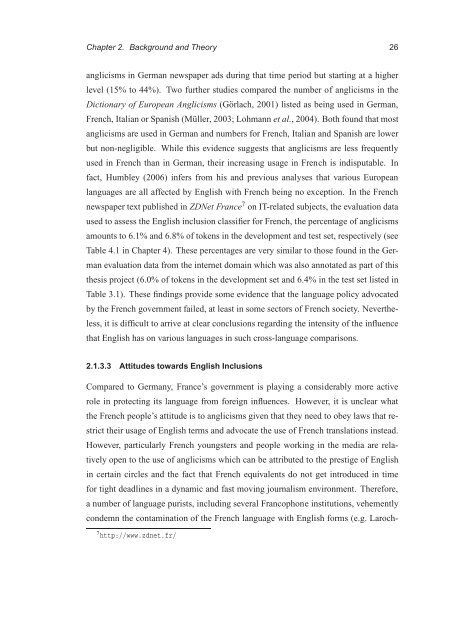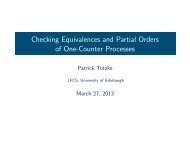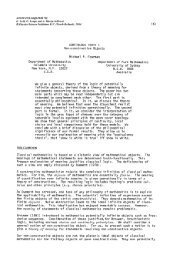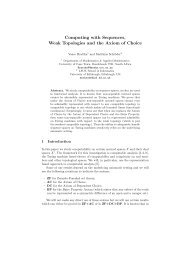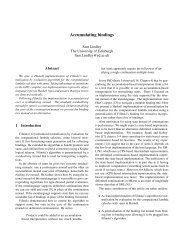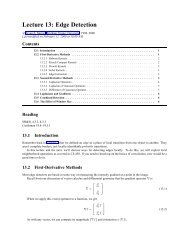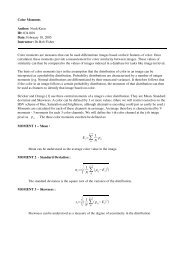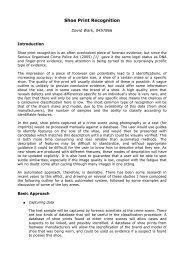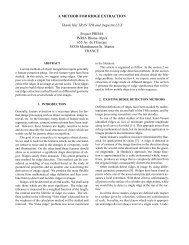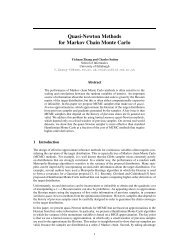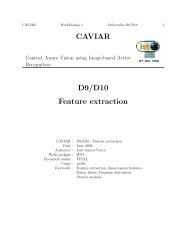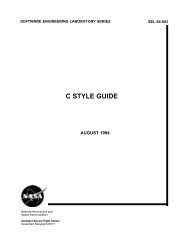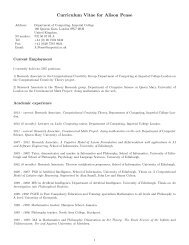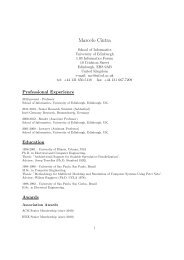PhD thesis - School of Informatics - University of Edinburgh
PhD thesis - School of Informatics - University of Edinburgh
PhD thesis - School of Informatics - University of Edinburgh
Create successful ePaper yourself
Turn your PDF publications into a flip-book with our unique Google optimized e-Paper software.
Chapter 2. Background and Theory 26<br />
anglicisms in German newspaper ads during that time period but starting at a higher<br />
level (15% to 44%). Two further studies compared the number <strong>of</strong> anglicisms in the<br />
Dictionary <strong>of</strong> European Anglicisms (Görlach, 2001) listed as being used in German,<br />
French, Italian or Spanish (Müller, 2003; Lohmann et al., 2004). Both found that most<br />
anglicisms are used in German and numbers for French, Italian and Spanish are lower<br />
but non-negligible. While this evidence suggests that anglicisms are less frequently<br />
used in French than in German, their increasing usage in French is indisputable. In<br />
fact, Humbley (2006) infers from his and previous analyses that various European<br />
languages are all affected by English with French being no exception. In the French<br />
newspaper text published in ZDNet France 7 on IT-related subjects, the evaluation data<br />
used to assess the English inclusion classifier for French, the percentage <strong>of</strong> anglicisms<br />
amounts to 6.1% and 6.8% <strong>of</strong> tokens in the development and test set, respectively (see<br />
Table 4.1 in Chapter 4). These percentages are very similar to those found in the Ger-<br />
man evaluation data from the internet domain which was also annotated as part <strong>of</strong> this<br />
<strong>thesis</strong> project (6.0% <strong>of</strong> tokens in the development set and 6.4% in the test set listed in<br />
Table 3.1). These findings provide some evidence that the language policy advocated<br />
by the French government failed, at least in some sectors <strong>of</strong> French society. Neverthe-<br />
less, it is difficult to arrive at clear conclusions regarding the intensity <strong>of</strong> the influence<br />
that English has on various languages in such cross-language comparisons.<br />
2.1.3.3 Attitudes towards English Inclusions<br />
Compared to Germany, France’s government is playing a considerably more active<br />
role in protecting its language from foreign influences. However, it is unclear what<br />
the French people’s attitude is to anglicisms given that they need to obey laws that re-<br />
strict their usage <strong>of</strong> English terms and advocate the use <strong>of</strong> French translations instead.<br />
However, particularly French youngsters and people working in the media are rela-<br />
tively open to the use <strong>of</strong> anglicisms which can be attributed to the prestige <strong>of</strong> English<br />
in certain circles and the fact that French equivalents do not get introduced in time<br />
for tight deadlines in a dynamic and fast moving journalism environment. Therefore,<br />
a number <strong>of</strong> language purists, including several Francophone institutions, vehemently<br />
condemn the contamination <strong>of</strong> the French language with English forms (e.g. Laroch-<br />
7 http://www.zdnet.fr/


